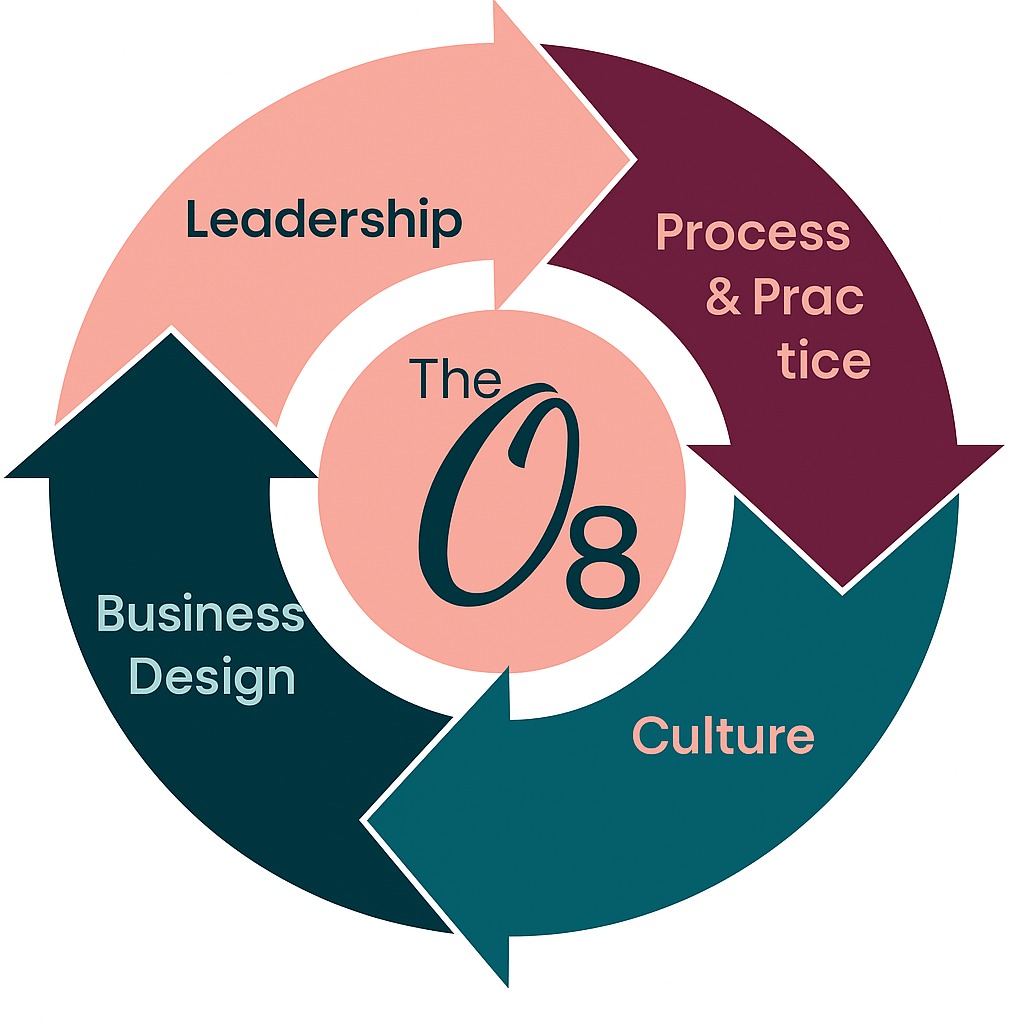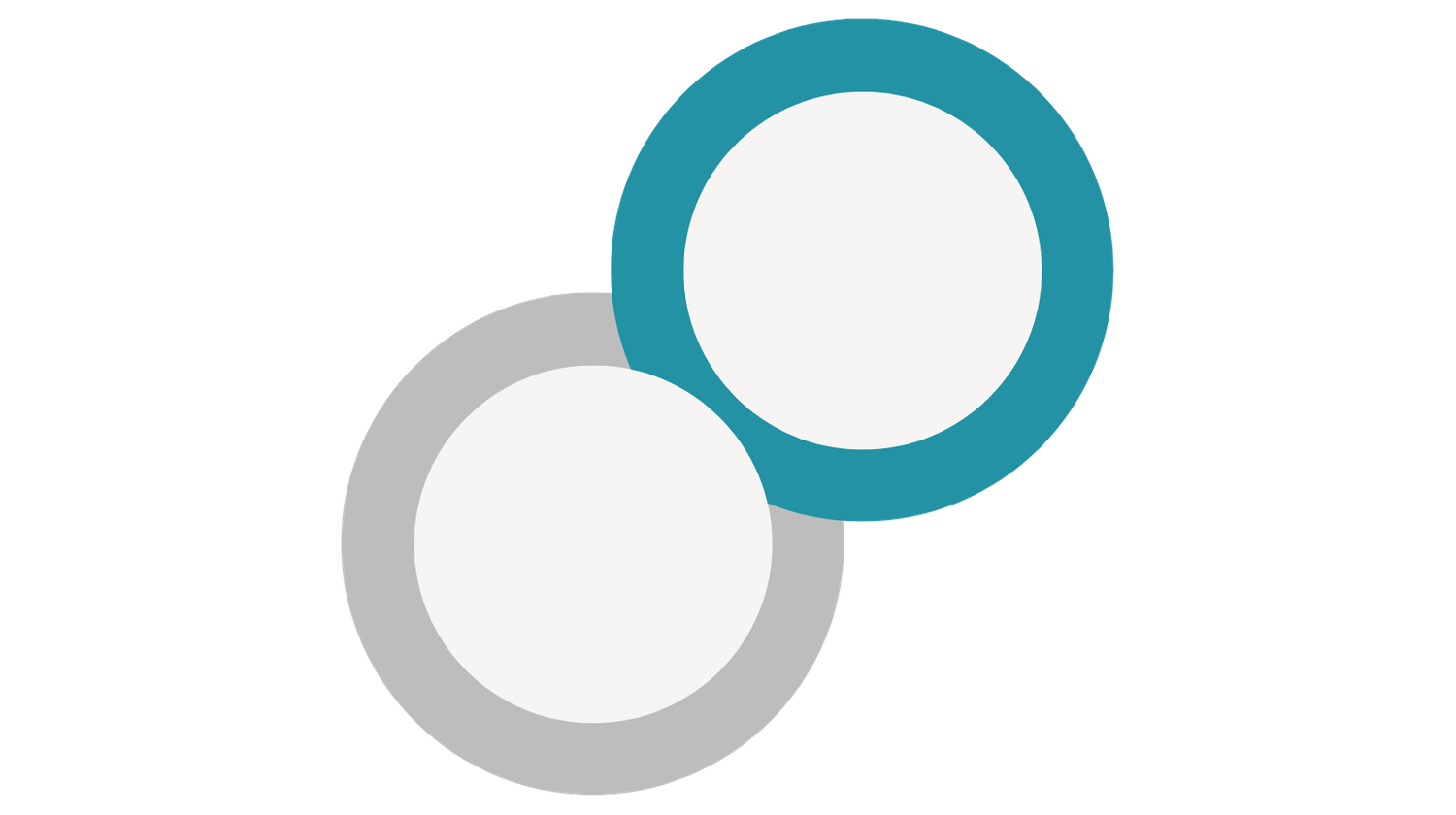Become an O8 Affiliate – Earn 20% commission on all sales.
Become an O8 Affiliate – Earn 20% commission on all sales.
The Shift: Why You're Not Stuck—You're Scaling the Wrong Thing
Episode 5 of The O8 Operation
You're looking at your revenue dashboard, and the numbers tell a story you're tired of reading. Technically, things are improving. You made more this quarter than last quarter. More this year than last year. But "more" still isn't enough.
You're still not consistently hitting what you used to make in your corporate job. The job with the steady paycheck, the benefits, the predictable income that let you sleep at night without calculating whether you could afford groceries and rent in the same month.
Three years in, and you're still explaining to yourself—and sometimes to your partner—why you're working weekends for what amounts to less than minimum wage some months.
But here's what makes it even more frustrating: it's not just that you're not making enough money. It's that you're working harder than you ever did in corporate for inconsistent results, managing more complexity than a job that paid you twice as much, and somehow you've created something that feels less sustainable than the career you left behind.
You're scaling, all right. You're scaling stress, complexity, and inconsistency. You're growing your business in ways that are making it harder to make money, not easier.
You're not stuck. You're just scaling the wrong things.
The Growth Trap That's Consuming Your Soul

Everywhere you look, the message is the same: grow, grow, grow. Scale to six figures. Then seven. Add more products. Reach more people. Build bigger teams. Create more systems. Automate everything.
But here's what nobody mentions: not all growth is good growth. Not all scaling creates freedom. And sometimes, the very strategies that got you to where you are become the prison that keeps you from where you want to go.
You started this business because you wanted something different. More flexibility. More impact. More control over your income potential. But somewhere along the way, you got caught up in scaling activities instead of scaling income. Building complexity instead of building wealth.
Now you're working harder than you did in corporate for less financial security. You've built something that looks like a business from the outside while feeling like an expensive hobby on the inside.
The Scaling Myths That Led You Astray
Let's talk about the growth advice that sounds logical but creates chaos in practice:
"Scale what's working." But what if what's "working" is barely covering your expenses? What if it's working inefficiently, requiring massive effort for minimal return?
"If you want to make more money, serve more people." But what if serving more people at low prices is actually keeping you poor while burning you out?
"Build multiple revenue streams for security." But what if juggling multiple small streams is preventing any of them from becoming substantial enough to actually support you?
"Just keep showing up consistently and the money will follow." But what if you've been showing up for three years and you're still not making what you made in your last job?
"Invest in your business to see returns." But what if you've invested everything you have and you're still waiting for returns that actually cover your living expenses?
The problem with most scaling advice is that it assumes you're already making good money and just want to make more. But what if you're still trying to make this thing financially viable? What if you're scaling complexity without scaling income?
The Real Cost of Wrong-Direction Growth

When you scale in ways that don't actually increase your income in proportion to your effort, the cost compounds:
Financial Stress: You're working more but earning less per hour than you did in corporate. The freedom you wanted feels like financial prison.
Opportunity Cost: Every hour you spend on low-value activities is an hour you can't spend on high-value work that could actually move the income needle.
Confidence Erosion: When your hard work doesn't translate to financial results, you start questioning whether you're cut out for this, whether your work has value, whether you should just give up and get a "real job."
Relationship Strain: It's hard to justify the long hours and financial uncertainty to family when you're making less than you could at a regular job with normal hours.
Resource Depletion: You're constantly reinvesting everything back into the business, living paycheck to paycheck even though you're the CEO.
Decision Paralysis: When money is tight, every business decision feels life-or-death. Should you invest in that course? Hire that contractor? Take that risk? The stakes feel impossibly high.
Identity Crisis: You left corporate to build something bigger, but now you're wondering if you've just built yourself an unpredictable, lower-paying job with worse benefits.
Most painfully, you start to wonder if this entrepreneurship thing is just a myth. If maybe the people making good money have something you don't—better connections, more luck, a secret you haven't discovered yet.
But that's not true. That's just what poorly designed scaling looks like. What you're experiencing isn't inevitable—it's the predictable result of scaling activities instead of scaling value.
What Sustainable Scaling Actually Looks Like

Real scaling—the kind that creates freedom instead of prison—isn't about doing more of everything. It's about doing more of the right things and less of everything else.
Sustainable scaling has these characteristics:
It amplifies your strengths instead of forcing you to become mediocre at everything. You get better at what you're naturally good at rather than constantly trying to shore up weaknesses.
It simplifies your decisions instead of complicating them. Clear systems and processes make choices obvious rather than overwhelming.
It increases your impact per unit of effort. You help more people or create more transformation without proportionally increasing your workload.
It aligns with your natural rhythms instead of demanding you become someone you're not. Your business works with your personality, not against it.
It creates compounding value over time. Each thing you build makes the next thing easier rather than harder.
It maintains your connection to the work that originally inspired you. You stay close to your zone of genius instead of getting buried in operations.
It generates energy instead of consuming it. You're more excited about your business as it grows, not less.
When scaling works right, your business becomes more elegant as it grows, not more complicated. You do fewer things but do them better. You serve more people with less effort because you've designed systems that multiply your impact.
The Alignment Audit: What to Scale vs. What to Eliminate
Before you can scale sustainably, you need to understand what's actually worth scaling. Not everything that's profitable should be expanded. Not everything that's working should be systematized.
Here's how to audit your current business for alignment:
Energy Assessment: Which parts of your work energize you versus drain you? Which activities make you feel more like yourself versus less like yourself?
Impact Measurement: Where do you create the most transformation for your clients? What work produces results that feel meaningful to you?
Competence Evaluation: What are you naturally excellent at versus what requires constant effort to maintain mediocrity?
Scalability Analysis: Which parts of your business get easier as they grow versus harder? What processes become more efficient with repetition versus more complex?
Value Alignment: Which aspects of your work align with your deeper values and vision versus which feel like you're just going through the motions?
Market Response: Where does demand naturally pull you versus where you have to push constantly to create interest?
The goal isn't to eliminate everything that's hard or challenging. The goal is to eliminate things that are hard in ways that don't build toward something you actually want.
The Three Pillars of Aligned Scaling
Sustainable scaling rests on three fundamental pillars. Remove any one of them, and your growth becomes unsustainable:
Pillar 1: Zone of Genius Amplification
Instead of trying to be good at everything, you get exceptional at the specific combination of skills and perspectives that only you bring. You scale by becoming more yourself, not less.
Pillar 2: Systems That Support Soul
Your operations enhance your ability to do your best work rather than replace it. Technology serves your values instead of dictating them. Processes create space for creativity instead of eliminating it.
Pillar 3: Selective Growth
You say no to opportunities that don't align with your vision, even when they're profitable. You choose depth over breadth, quality over quantity, sustainability over speed.
These pillars work together to create what I call "integrated scaling"—growth that makes you more of who you are instead of less.
The Permission to Scale Differently
Here's what I need you to understand: you don't have to scale the way everyone else scales. You don't have to follow the traditional trajectory of more products, bigger teams, complex funnels, and corporate-style operations.
You can scale in ways that honor your values, leverage your strengths, and create the kind of life you actually want to live.
This might mean:
Scaling depth instead of breadth. Serving fewer types of clients but serving them more profoundly.
Scaling expertise instead of offerings. Becoming known for one thing you do exceptionally well rather than being decent at many things.
Scaling relationships instead of transactions. Building a smaller community of deeply engaged people rather than a large audience of casual followers.
Scaling quality instead of quantity. Creating premium experiences that command premium prices rather than competing on volume.
Scaling wisdom instead of information. Developing insights and perspectives that can only come from your unique combination of experience and expertise.
Scaling presence instead of productivity. Being fully available for the work that matters most rather than being partially available for everything.
The business world will try to convince you that there's only one way to grow successfully. But the most sustainable businesses are built by people who had the courage to scale according to their own design instead of someone else's blueprint.
The Compound Effect of Right-Direction Growth

When you scale in alignment with your strengths and values, something magical happens: the growth becomes exponential rather than linear.
Your reputation amplifies naturally because you're known for specific excellence rather than general competence.
Your client base becomes self-selecting because your clear positioning attracts people who want exactly what you offer.
Your content creation becomes effortless because you're always talking about the work that energizes you most.
Your pricing power increases because you're offering something unique and valuable rather than competing in crowded markets.
Your referrals multiply because clients can easily explain what makes you different and who else might benefit.
Your energy regenerates through your work instead of being depleted by it, creating sustainable momentum for continued growth.
Your innovation accelerates because you're building on strengths rather than constantly trying to compensate for weaknesses.
Most importantly, your confidence compounds because you're getting better at being yourself rather than trying to become someone else.
The Shift from Grinding to Gliding
There's a moment in every entrepreneur's journey when growth stops feeling like pushing a boulder uphill and starts feeling like catching a wave. When momentum works with you instead of against you. When success feels inevitable instead of exhausting.
This shift doesn't happen because you suddenly work harder or discover some secret strategy. It happens when you stop trying to scale everything and start scaling strategically.
When you focus your growth energy on the things that are most aligned with who you are and what you're building toward, everything else gets easier. Not because the work disappears, but because you're finally working in the direction of your natural strengths instead of against them.
The Courage to Subtract
Sustainable scaling often requires subtraction before addition. Elimination before optimization. Saying no before saying yes.
This is where most people get stuck. They can see what they need to add to their business, but they can't bring themselves to remove what's not working.
Maybe it's a service that pays well but drains your soul. Maybe it's a client type that's profitable but problematic. Maybe it's a revenue stream that works but doesn't align with where you're going.
The courage to subtract—to deliberately choose less so you can have more of what matters—is often the difference between scaling sustainably and scaling yourself into exhaustion.

Your Business as Expression, Not Extraction
The most profound shift in sustainable scaling is moving from seeing your business as something that extracts value from you to something that expresses value through you.
Instead of asking "How can I get more from my business?" you start asking "How can my business get more from me?" Instead of trying to optimize yourself for your business model, you optimize your business model for yourself.
This isn't selfish—it's strategic. When your business is designed around your natural gifts and genuine interests, you show up as the best version of yourself. And the best version of yourself creates the most value for everyone you serve.
The Integration Point
You've spent the last four weeks examining the pieces: clarity of signal, supportive systems, strategic community, and now aligned scaling. But pieces are just pieces until they integrate into something cohesive.
Next week, in our final episode, "The Heist," we're bringing it all together. We're looking at what becomes possible when all eight layers of The O8 work in harmony. When your strategy supports your soul, your systems amplify your strengths, your signal cuts through noise, and your scaling creates freedom instead of prison.
But for now, consider this: What if the growth you've been chasing isn't the growth that will actually fulfill you? What if scaling differently—scaling in alignment with who you really are—could create not just more success, but more satisfaction?
What if you're not stuck at all? What if you're exactly where you need to be to make the shift toward scaling that serves you instead of consuming you?
The shift begins when you stop asking "How fast can I grow?" and start asking "How well can I grow?"
Ready to scale in a direction that actually takes you where you want to go?
The O8 Operation concludes next Tuesday with Episode 6: "The Heist" - This Time, You Win (The Complete Blueprint for Business That Works).
Aligned scaling is just one layer of The O8. Ready to see how all eight elements integrate to create a business that grows with your genius instead of despite it? Learn more about The O8 here.
THE GETAWAY
Your final destination for ditching the overwhelm and stress of running a business.
Get The BRIEF
Smart plays - straight to your Inbox!



